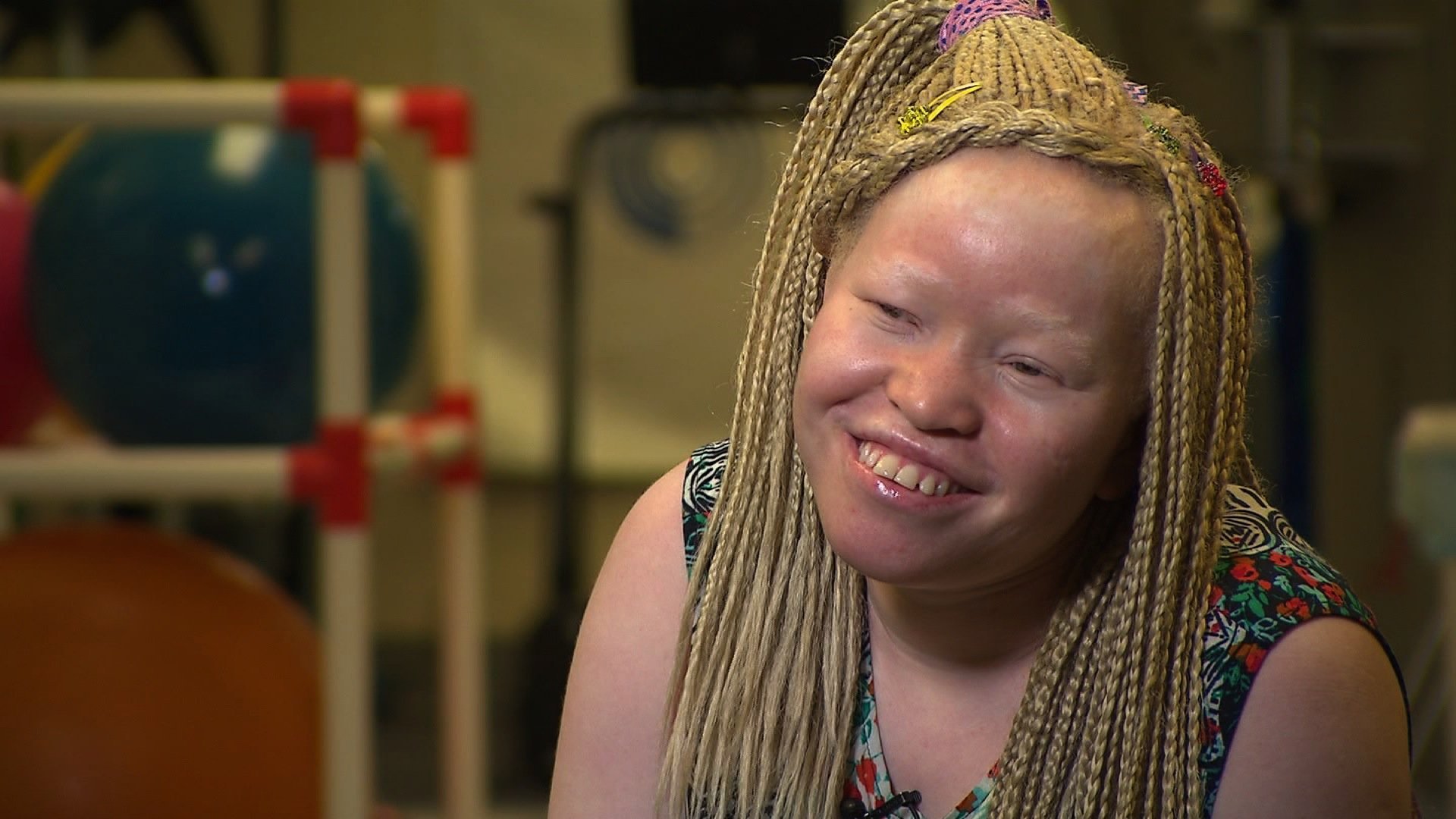Bibiana Mashamba loves to dance, run and jump — all the attributes of a thriving teenager.
But at age 16, all that has taken a back seat as she struggles to walk following a merciless attack that nearly killed her.
“At 11 at night, some robbers came into our room,” Mashamba says, recalling the terrifying day six years ago near the city of Mwanza in her home country of Tanzania.
The robbers wanted something much more precious than jewels or electronics. They wanted the bones of the teen born with albinism.
Body parts of albinos are highly sought in some African countries, where some mistakenly believe they bring wealth and good luck. Attackers chop off limbs, pluck out organs and sell them to witchdoctors.
In Mashamba’s case, they got what they came for.
They hacked off her right leg, two fingers and tried to chop off her left leg but ran off before they could get through the bone.
Drugged before attack
Mashamba says she did not know what was happening at first. Whoever attacked her drugged her beforehand, while she slept.
She was sleeping in the same room as her sister and cousin, and the latter woke up to see the blood and the robbers. She screamed, and the adults dashed in.
“I was in the hospital for 10 months,” Mashamba says, her wide grin gone for the first time during the interview.
“It was so painful.”
‘The work of the devil’
The teen may not know who attacked her, but she knows why.
She was hunted down and chopped up because of her skin color. Her stark white skin and blond hair attract the worst kind of attention in her home country.
The belief propagated by witchdoctors that the bones of people with albinism are magic and will make you rich has spread across parts of East Africa.
“Those witchdoctors who are telling them to come and chop our limbs, they are liars,” she says. “How can someone get rich off my bones? I am not rich and they are my bones. This is the work of the devil.”
In the United States, about one in 20,000 people have some type of albinism. But in some East African countries such as Tanzania, the number can be as high as one in 1,500.
‘Stunningly vicious’
The U.N. High Commissioner for Human Rights says this year, people with albinism have experienced a surge in violent attacks in East Africa.
“These attacks are often stunningly vicious, with children in particular being targeted,” Zeid Ra’ad Al Hussein says in a statement.
“As a result, many people with albinism are living in abject fear. Some no longer dare to go outside, and children with albinism have stopped attending school because of the recent spate of assaults, murders and kidnappings.”
Mashamba and her sister, Tindi, know that by experience. They have endured taunting all their lives for being albinos.
The two lived with their aunt and uncle, who took them in after their sick parents died. But after they were discharged from hospital following the attacks, they decided it was not safe to live with them anymore.
“If I go back again to our village again, they could maybe kill me,” Mashamba says.
Tanzanian politician Al-Shymaa Kway-Geer heard their story and took them in. Kway-Geer, the first albino to hold office in the country, became their new caretaker.
Archaic prosthesis
While Mashamba had a safe place to live in Dar es Salaam, her life was far from what she had envisioned.
The prosthesis she was given was archaic. Dancing, running and jumping were impossible. Even walking to school became painful. At times, she would slip and fall while going up a hill. Beyond anything, she wanted to be able to learn.
“I enjoy math, I enjoy science, I enjoy English. I enjoy history. I enjoy everything,” she says.
At 16, she got yet another surprise that would change her life.
Strangers step in
The African Millennium Foundation run by Malena Ruth offered to pay for the two sisters to come to the United States so Mashamba would get the best care and technology available to amputees.
“She taught me so much. She taught me what courage is, what dignity is,” Ruth says with tears in her eyes.
Ruth has become the girls’ guardian as Mashamba goes through physical therapy with the new prosthesis she received at the Orthopaedic Institute for Children in Los Angeles.
“It was a horrible tragedy no child should have to know — their house raided and your body parts removed,” she says.
“And unfortunately, this tragedy kind of extended beyond that horrible night in that she had some individuals that were really interested in helping her but there wasn’t the ability to kind of do the coordinated care that she really needed,” says Dr. Anthony Scaduto with the institute.
With her upgraded prosthesis and physical therapy, Mashamba can enjoy some of the physical freedoms she longed for.
The sisters are determined to use their past trauma to shape their future.
“I want to be a doctor so I can heal other children’s bones,” a smiling Mashamba says.
Tindi, who can’t bear to see the suffering her sister endured, has a different plan.
“I want to be a judge in my country so that I can punish people who hurt others,” she says.



